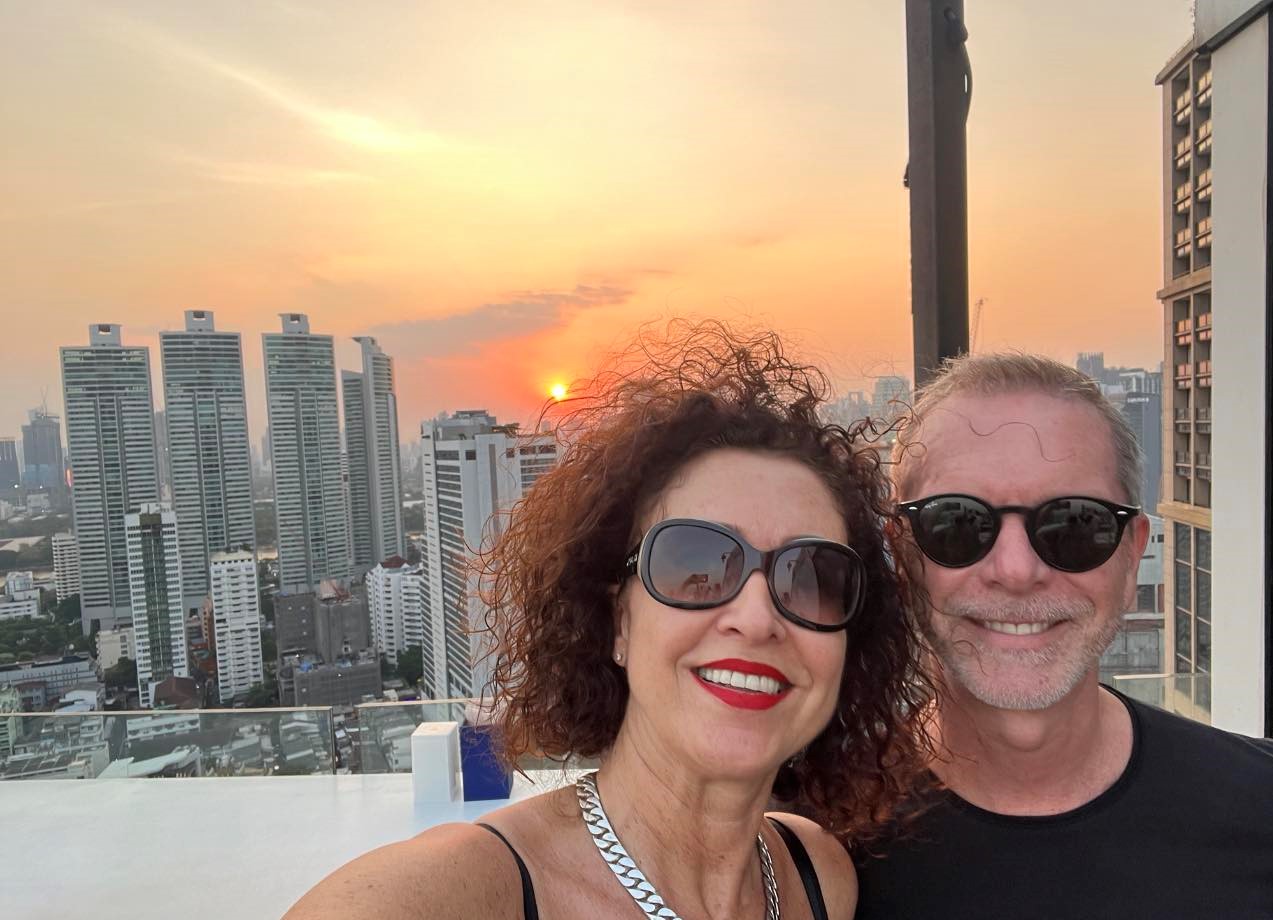
Sei sicuro di voler sbloccare questo articolo?


Giovanni arrives with motorcycle helmet in hand, his wife Elisabetta greeting him with her beaming smile that lights up even more at the sight of him. We're at Gigi Café, an establishment with a French-style dual status as a bar and restaurant, along Soi Sukhumvit 11 in Bangkok, right in the center of the beating heart of the Thai capital. In the kitchen, however, and at the dee jay console is an Italian, you can hear it and see it, he is Edoardo Bonavolta, who prepares the dishes with Italian taste and aesthetics, while the music, although on disco rhythms, is for the most part a reinterpretation of the best-known Italian songs of the 60s and 70s.
Giovanni Fontanelli and Elisabetta Zuccaro, are spouses and parents of four children, two boys and two girls, born from previous marriages of each of them. With them lives their daughter from their union, Giorgia.
Giovanni and Elisabetta, are the very embodiment of appeal and joie de vivre, both in love with travel and driven by a common passion for finding new corners of the Planet to discover.
They met while working in the same company, Electrolux, a well-known Swedish multinational company that operates mainly in the production of appliances for home and professional use.
Elisabetta: "My professional background is as a primary school teacher, but my professional activity has been in the role of assistant manager, plan manager. That is how I met John, who was also professionally engaged in the Pordenone office of Electrolux. Once I became a mother of two children, this was the dimension that greatly occupied my existence and to which I was totally dedicated. Giovanni, on the other hand, received different directions from time to time about the locations of professional operation, so from the Pordenone office he worked in the headquarters of the parent company, I followed him, of course, to Sweden. Then in 2019 we arrived here in Thailand and, shortly, we will move to our next destination, which is Charlotte, in the United States.
What was your Thai experience like?
As soon as we arrived in Thailand from Sweden, the contrast between the two cultural worlds was very apparent; however, we were attracted by the exotic nature of our new location and as always, we were driven by curiosity, a desire to know. As of today, really wanting to take stock of our stay, we find ourselves at a “chiaroscuro” scenario, let us say. The people, the Thais, are animated by a kind character, an approach that is always welcoming and marked by thoughtfulness toward you. In the medium to long term, however, some aspects of life in Thailand, especially in the Capital, Bangkok, also show the complexities of living in a megacity, such as almost perpetually congested traffic, pollution, and overcrowding in some urban areas.
A real watershed was the Covid: we were able to disengage from the Bangkok lockdown, we stayed in Hua Hin, and while our children were doing their schoolwork by teleconference, while Joe was able to fulfill his work by teleconference, we were able to enjoy the wonderful scenery, with minimal restrictions compared to those that were imposed in the big cities, especially Bangkok. We returned to the capital only when school activities were back "in attendance" so we had to physically accompany our children to school. When -during the Bangkok lockdown- we were in Pattaya, that city seemed quiet, decently livable, with a lovely seascape. Quite a different scene presented itself when, in "normal" times, we passed through Pattaya itself and were presented with a typical scenario of overcrowded touristy, metropolitan-suburban, in short, a now-typical scene in which I cannot find myself comfortable.
And in the working world, have cultural differences weighed in?
Giovanni: There is a lot of oleography about the way Thais are and behave in the working world. However, you have to take into account certain aspects, including the fact that we look at all of this with eyes and evaluation parameters that are Western. In terms of my personal experience, in the company I work for here in Thailand, I have found, on the other hand, a special attention to detail, a sense of discipline and respect for rules. Colleagues have been very active in welcoming us and very kind in helping us with practical things regarding living and staying in Thailand.
Thais work well in teams; notoriously, local labor regulations strongly push investing companies to hire local staff, but once the tasks and all the work steps that need to be accomplished on a daily basis are clarified, everyone in their role is committed and follows directives. About the reliability of the collaboration over time, unlike other occupational placements, here we move to other occupations less frequently than in other occupations and types of work. The fact that one must have educational and professional qualifications specific to the Electrolux sales branch tends to identify job figures suitable for this company and these jobs it provides. Working as a team, respecting roles and positions, then, makes all of this an organism moving toward one common goal. There is thus a certain continuity over time and there is structured, at the same time, a sense of familiarity, a sense of belonging. The production facility in Rayong, for example, is completely self-sufficient and operated following the guidelines that were issued by the parent company and adapted and applied here in the Thai context. It is a process that takes place here in Thailand, as in Sweden, Germany or elsewhere. There is no difference. So I think the point is another one: the definition of specific awareness. The moment you make available to local colleagues and employees all the conceptual equipment sufficient to be able to operate and work properly, everything proceeds in a standard way without any particular deviation.